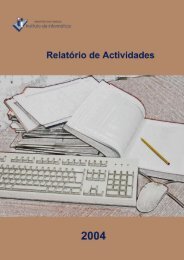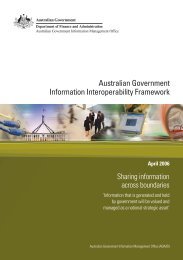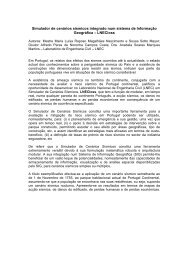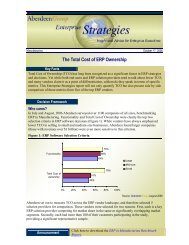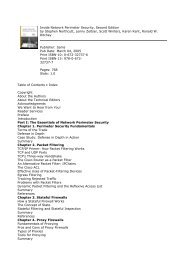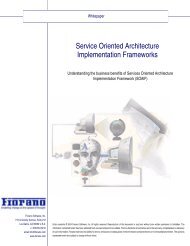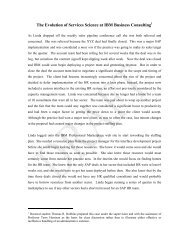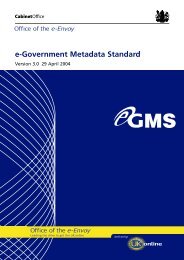OECD Peer Review of E-Government in Denmark - ePractice.eu
OECD Peer Review of E-Government in Denmark - ePractice.eu
OECD Peer Review of E-Government in Denmark - ePractice.eu
You also want an ePaper? Increase the reach of your titles
YUMPU automatically turns print PDFs into web optimized ePapers that Google loves.
External audit<br />
Another important element <strong>of</strong> effective e-government monitor<strong>in</strong>g and evaluation can be provided<br />
by audit organisations work<strong>in</strong>g <strong>in</strong>dependently <strong>of</strong> other government organisations. In <strong>Denmark</strong>, the<br />
National Audit Office (NAO) is charged with exam<strong>in</strong><strong>in</strong>g whether State funds are adm<strong>in</strong>istered <strong>in</strong><br />
accordance with the decisions <strong>of</strong> the Parliament. In addition to undertak<strong>in</strong>g f<strong>in</strong>ancial audits, the NAO<br />
also conducts performance audits that look at how well specific tasks or projects have been conducted<br />
by government organisations, with a focus on economy, efficiency, and effectiveness. To date, the<br />
NAO has undertaken audits <strong>of</strong> specific IT projects and established recommendations around the<br />
development and evaluation <strong>of</strong> the bus<strong>in</strong>ess case for e-government projects, but it has not yet carried<br />
out an audit explicitly focused on e-government (despite hav<strong>in</strong>g discussed the possibility <strong>of</strong><br />
conduct<strong>in</strong>g such an audit with the Digital Task Force).<br />
This lack <strong>of</strong> <strong>in</strong>dependent <strong>in</strong>formation for the Parliament about e-government activities is mirrored<br />
by a relative lack <strong>of</strong> <strong>in</strong>formation on e-government provided to both m<strong>in</strong>isters and <strong>of</strong>ficials. This lack<br />
<strong>of</strong> communication contrasts with the report<strong>in</strong>g that exists around the <strong>Government</strong>’s various IT Action<br />
Plans (with<strong>in</strong> which some <strong>in</strong>formation about e-government is provided). The Digital Task Force does<br />
provide some <strong>in</strong>formation about the results <strong>of</strong> the e-government strategy on its Web site. This<br />
report<strong>in</strong>g is, however, descriptive rather than evaluative, and is not comprehensive <strong>in</strong> its coverage <strong>of</strong><br />
all the targets <strong>of</strong> the strategy.<br />
Overall, this apparent low level <strong>of</strong> demand and supply <strong>of</strong> rigorous monitor<strong>in</strong>g and evaluation <strong>of</strong><br />
e-government to the Parliament, m<strong>in</strong>isters and <strong>of</strong>ficials stands <strong>in</strong> contrast to the practices <strong>of</strong> many<br />
<strong>OECD</strong> countries.<br />
External audit at the local government level<br />
The Structural Reform proposes establishment <strong>of</strong> an “<strong>in</strong>dependent evaluation <strong>in</strong>stitute” under the<br />
M<strong>in</strong>istry <strong>of</strong> the Interior and Health (subject to discussion with municipalities). The <strong>in</strong>tended purpose<br />
<strong>of</strong> this <strong>in</strong>stitute will be to support effective decentralised provision <strong>of</strong> public services by exam<strong>in</strong><strong>in</strong>g<br />
and publish<strong>in</strong>g comparisons <strong>of</strong> the performance <strong>of</strong> <strong>in</strong>dividual municipalities. It is expected that<br />
municipalities will benefit from access to knowledge about how best to deliver results, and their<br />
efficiency <strong>in</strong> us<strong>in</strong>g resources will improve, especially through improved f<strong>in</strong>ancial management. The<br />
overall outcomes <strong>of</strong> establish<strong>in</strong>g the <strong>in</strong>stitute are expected to be: 1) an improvement <strong>in</strong> the basis for<br />
political decision mak<strong>in</strong>g; 2) assurance that citizens will receive the best quality public services <strong>in</strong><br />
return for their taxes; and 3) an <strong>in</strong>crease <strong>in</strong> public sector openness and transparency.<br />
Interview participants expressed a general consensus that, <strong>in</strong> pr<strong>in</strong>ciple, the proposal is a good idea<br />
which should contribute to improved local government performance. It was not clear, however,<br />
exactly where the <strong>in</strong>stitute would be established, how it would be governed, resourced or organised,<br />
and whether it would focus on e-government as part <strong>of</strong> its activities.<br />
Given the contribution that e-government is expected to make to the goals that the <strong>in</strong>stitute will<br />
support, and also the widespread benefit that <strong>in</strong>creased shar<strong>in</strong>g <strong>of</strong> e-government experience and good<br />
practices among local government organisations could deliver, many <strong>in</strong>terviewees felt that<br />
e-government could be a very important focus area for the new <strong>in</strong>stitute. Some also questioned the<br />
decision to limit the scope <strong>of</strong> the <strong>in</strong>stitute to work only with municipalities, wonder<strong>in</strong>g whether it<br />
could also add value at the regional level.<br />
144





